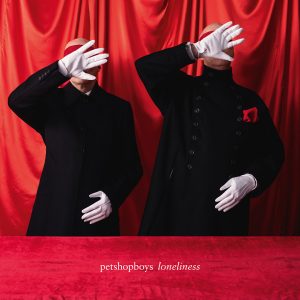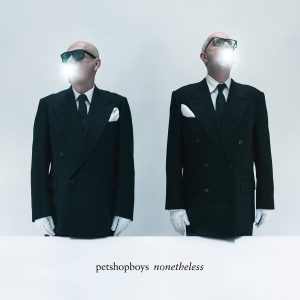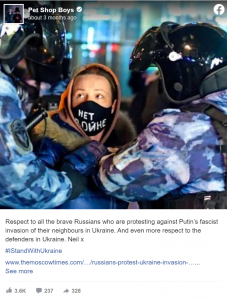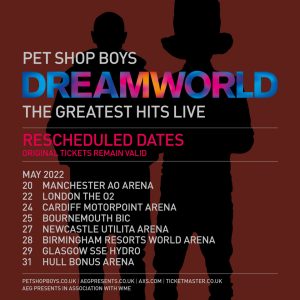"I dont like egotistical people; I dont like huge egos out of control, all that being treated as someone special with your huge entourages being whisked off to VIP rooms type of thing. I find that attitude a real turn off. Thats why I dont do much press, because I dont like talking about myself all the time."
Chatting down the line from his London studio Pet Shop Boy producer Chris Lowe, is surprisingly (and thankfully) extremely chatty despite his well-known dislike of publicity and being recognised. Hes also remarkably down to Earth, particularly given that with his PSB partner Neil Tennant he belongs to Britains most successful pop duo of all time. Not that hed see it that way, in terms of fame, money or even whether hes a pop star, at least in the usual sense of the term.
"Ive never sought fame or public recognition. I think one of the qualities many pop stars have, which is why they are what they are, is because they have huge egos, whereas Im actually against the whole concept of ego," he explains. "Everything I do tends to be contradictory."
One thing hes less contradictory about his music, which remains an abiding passion some 20 years into his career.
Ive always loved going in the studio, having fun and seeing what comes out of it. Were always working though I would probably like to work less but Neil likes to be busy all the time, Im a lazy git, and Id be quite happy to disappear for two years to go trekking but our diaries are always pretty full," says Chris.
"I think thats a good thing really, because otherwise you just disappear. When you stop or go away its so easy to lose touch with whats going on in England, even if you go away for a three week holiday youve lost the plot. I dont know how these superstar DJs manage to travel around the world and still keep in touch with whats happening. I think its good to keep on top of it all."
Skrufff (Jonty Skrufff): You recently released another PSBs Greatest Hits album as well as your current single Flamboyant, do you feel like you starting a new phase of the Pet Shop Boys?
Pet Shop Boys: "Whats different about now is that weve really been inspired by the electroclash scene, its rejuvenated our interest in clubbing again. House music lasted a very long time (laughing) and I was always a huge fan but I think we were ready for something new to come along. I cant deny the electroclash scene has been an influence on Flamboyant for example. The other factor is that now you can get all these virtual analogue keyboards that we used to use in the 80s. You can now get them as plug-ins so thats also given us a whole new impetus, weve been able to access all these great old sounds that we used to use and do more with them in the computer. Those two factors have come together for us to start producing more electronic sounding music again."
Skrufff: George Michael was talking recently of a dreadful creative block he had, saying he was worried he couldnt write anymore, do you ever go through that kind of emotion?
Pet Shop Boys: "Hes never been very prolific, has he? I imagine that almost every song hes written is on an album, whereas with us you often get an albums worth of songs with each single. Weve never had creative blocks, Ive always loved going in the studio, having fun and seeing what comes out of it. No doubt that could happen at some point. All songwriters are supposed to have a ten year period of writing good stuff then after that its all over, though were 18 years in."
Skrufff: Youve had number one hits throughout your career, what criteria do you judge success by these days, are you judging by chart positions?
Pet Shop Boys: "Charts are a different side of success. There are two elements, the success of the record creatively, ie whether the record has an emotional impact on the listener then theres the chart thing. Both Neil and I would still love to be at the top end of the charts all the time and we still manage that, Miracles was top 10 but were doing it these days without mass media coverage, which is actually quite a struggle. Englands quite a strange place in the sense that the media will suddenly decide theyve had enough of you and move on whereas in other countries its different. Thats a fair enough attitude if the artist has lost it or has stopped making good music but I think were still producing good music personally."
Skrufff: DJ Hells recently remixed West End Girls, how do you feel about other producers reworking your version, do you feel in any way competitive?
Pet Shop Boys: "Oh no, I get totally excited by it. We almost always choose the remixers and I find it very exciting to hear how someone else interprets your song and giving it a more clubby feel. I think DJ Hells mix is great, hes done it really punky and all the sounds are very dry. I think its quite shocking."
Skrufff: Is Hell someone you know personally?
Pet Shop Boys: "Ive only met him very briefly in the DJ booth at Nag, Nag, Nag last year. I remember reading about some famous party he had in Barcelona. He also designed a special label for West End Girls. I really like the whole aesthetic of Gigolo Records."
Skrufff: Do you know electroclash-man Larry Tee in New York, hes just opened a new club at Pyramid, on Avenue A?
Pet Shop Boys: "Pyramids back? Thats good because I thought clubbing was over in New York. I cant believe what theyve done to New York nightlife in the last few years though Im sure well follow suit here in England. I hope if they do try and bring those rules in over here, that theres some sort of uprising."
Skrufff: What do you make of the puritan anti-club culture attitude prevalent in the States currently?
Pet Shop Boys: "I just dont understand it at all. New York advertises itself as a 24 hour vibrant city but when you remove that night-time element from it, theres not a lot left; its just a boring city with tall buildings. Its a lot safer admittedly. I remember being near the Port Authority Bus Terminal in the mid 80s and it was terrifying. There was a very interesting club there, actually in the Port Authority Bus Terminal. Though Im actually in favour of the no smoking ban (bursting with laughter). Im a massive contradiction. You just cherry pick the bits you like but I do like going to a club and not stinking (of tobacco) when I get home. I think there should be smoking areas in clubs, thatd be a good compromise. Another outcome of all these rules could be to make the scene more underground again, the beginning of the rave scene, for example, was totally illegal and it was fantastic. I loved all of that."
Skrufff: Were you going raving through all the Shroom days of the late 80s?
Pet Shop Boys: "Yes. Though what I really liked doing was driving up to places like Walthamstow (North-East London) looking for raves and seeing a lad standing by the road, with an arrow, saying this way. I used to love all those raves and warehouse parties. I remember touring round the UK at the time when the rave scene hadnt spread outside London and Manchester and being shocked at seeing people still going to old fashioned clubs."
Skrufff: You grew up in Blackpool, a northern party city with quite a tough reputation .
Pet Shop Boys: "Blackpool certainly can be quite a violent place though I think Blackpool, and actually every town centre in England, is more violent now than it was in my day, though maybe thats because Ive turned into a soft southerner. When you go outside London, you do think Gor blimey, how scary is this? I went to watch Arsenal in the FA Cup Final in Cardiff, for example, and, my God, Cardiff on a Saturday night, Wow! Its got an incredible air of violence and aggression that I dont remember when I was younger."
Skrufff: Were you born in Blackpool?
Pet Shop Boys: "I was born there and grew up near the Pleasure Beach (Blackpools rollercoaster theme park). The Pleasure Beach was literally at the end of my road so it was great to hear the noise of the rollercoaster. The good thing about growing up in Blackpool was that you spent all your time hanging round amusement arcades. I also used to go to a club called Man Fridays which had plastic palm trees, during the disco era, and I did odd jobs as a glass collector. I remember seeing a horrible fight once on Central Pier, when this lad was getting his head kicked in by about a dozen other lads, it was such a horrible sight.
One of the things I always liked about the rave scene was that it wasnt about violence; it was about love and that was a huge change. Because people forget nowadays that the only time that men ever went on the dance floor before the rave scene was at the end of an evening, to chat up a girl. Men never used to dance; theyd stand round the edge of the dance floor while the girls danced around their handbags. Lots of people wont remember that far back."
Skrufff: You were in London during the New Romantic era of 1981/ 82 when people like Boy George and Steve Strange were all over the club scene, were you also going out on that scene?
Pet Shop Boys: "Me and Neil were there but we werent really part of it, we were more like observers on the periphery. I found that whole New Romantic era so exciting, Ive always loved people dressing up and being flamboyant and going against the norm, but Im just not one of those people who does it. Even though I admire it so much in other people."
Skrufff: Were you ever tempted to try it out?
Pet Shop Boys: "No, I wasnt tempted at all, the only time Ive ever dressed up is as a Pet Shop Boy. Everything I do tends to be contradictory. My favourite fashion clothes during the new romantic days were casual. I loved the casuals, and loved having a Fioruccci top and Tacchini jeans and even now I still like Stone Island. Ive never been into wearing make-up either, its just not me, but Ive always liked going to those clubs where people do. I went to the opening night of the Camden Palace in 1982, Steve Stranges night, and went there wearing a sweat shirt and a pair of jeans; I dont know how I got in. There were people dressed in amazing costumes being turned away but for some reason they let me in."
Skrufff: I read in on old Guinness Book of Rock Stars that you were dropped by CBS in 1984 when West End Girls was first released, after it failed to chart. . .
Pet Shop Boys: "We werent dropped, what happened was, we had a one single deal."
Skrufff: Did you lose faith at all when the song failed to make the charts the first time round?
Pet Shop Boys: "No, because although it got a little play on Radio 1it amazingly got a huge amount of play on K Roc in Los Angeles and was their screamer of the year, in other words, their biggest record of the year, and had a huge impact so we still thought the song had something. So then when we signed to Parlophone we went on to re-record it. You never know when youre going to have success. When you havent had any success, you cant imagine ever having it, because you cant imagine that the radio stations will ever play your records. So when it does happen, its amazing."
Skrufff: How easy was it to avoid going off the rails, when you achieved number one hits?
Pet Shop Boys: "We were both quite old when we started, Id already finished six years of university, so we werent young, though I dont know if that makes you more sensible or not. Im not such an excessive kind of person anyway, I dont have an addictive personality, my brain and my body have real cut-off points, which says go to bed. I know people whove had problems and they dont seem to have that cut-off point, they go out on a Friday and theyre still out on Monday afternoon. I like sleeping too much, I love going to bed. I think thats a real safety valve."
Skrufff: Some pop stars talk of fame and worldwide success as being hollow when they get it, whereas you seem quite fulfilled by the whole thing, has money brought you happiness?
Pet Shop Boys: "Money? Money doesnt bring you happiness though its nice not to have to worry about it too much, which isnt the same thing as happiness. That sounds terrible to someone whos sleeping on the streets. Happiness is a very complicated issue and its not simply related to money. Ive never sought fame or public recognition. I think one of the qualities many pop stars have, which is why they are what they are, is because they have huge egos. Im actually against the whole concept of ego, I dont like egotistical people, I dont like huge egos out of control, being treated as special with your huge entourages being whisked to VIP rooms. I find that attitude a real turn off. Thats why I dont do much press, because I dont like talking about me all the time. When you think about those huge rock stars with their huge egos, if thats the only thing thats driving them, then maybe thats why theyre not fulfilled ultimately."
Skrufff: Do you feel a sense of drive to keep on going long term with the Pet Shop Boys?
Pet Shop Boys: "God yeah, were really driven, we love doing what we do and we love writing songs. Were into it, we still watch Pop World on a Sunday."
Skrufff: Any relationship is difficult to maintain for 20 years, how easy has it been to maintain your relationship with Neil?
Pet Shop Boys: "Ive not really thought about it, we get on. Neils really funny and good company and we have the same interests. I think the main thing is that we enjoy working together. I read something about Michael Stipe saying REM could only function if they spend a lot of time apart and I thought well, why bother?"
Pet Shop Boys Flamboyant is out now on Parlophone (as is their latest Greatest Hits compilation PopArt: The Hits.
Taken from: http://www.tranzfusion.net/
Interviewer: Jonty Skrufff





